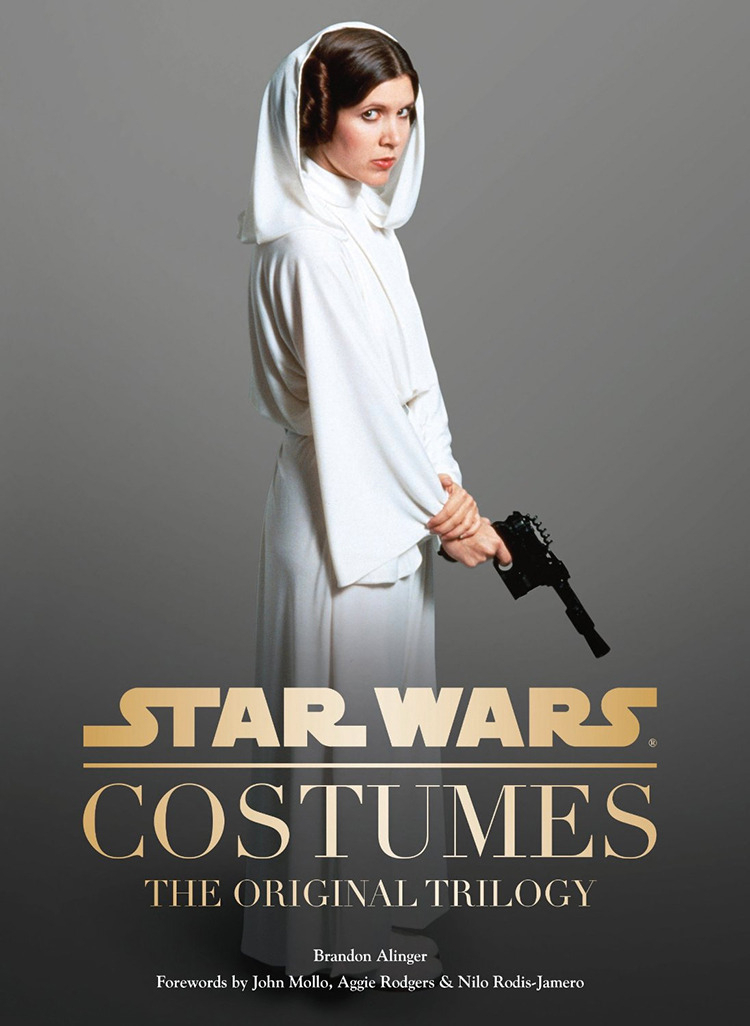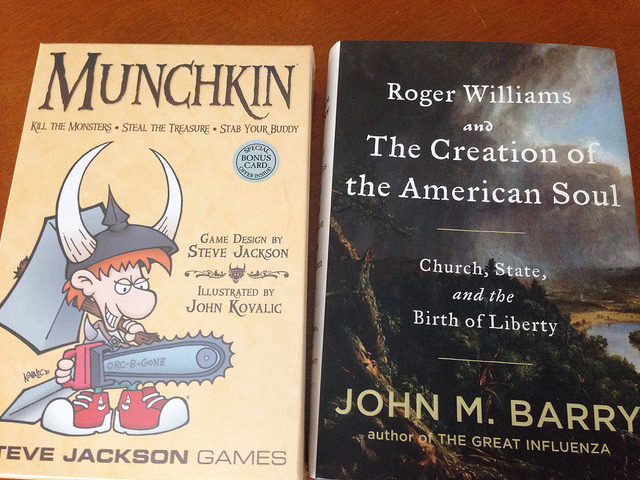book
Retrophisch Review: Outlaw
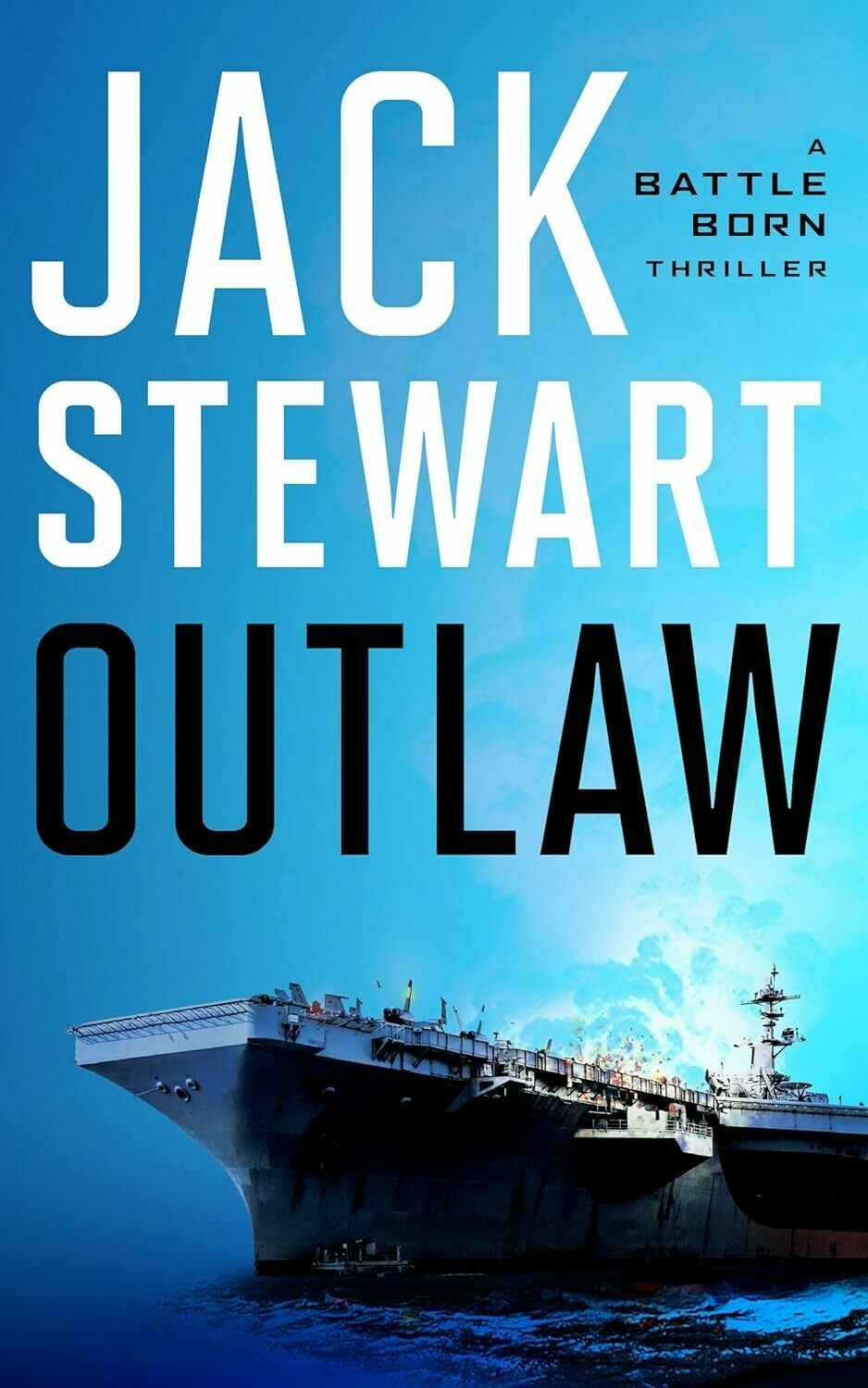 I will be honest up front that it is impossible for me to be totally unbiased in this review. I got to know the author, Jack Stewart, a bit before his first book, Unknown Rider, was published, and that is documented in the review linked to the just-mentioned title. That said, I respect Jack enough as a writer to not ask for hints and tidbits in our conversations, and he respects me as reader in only offering teasing morsels to whet the reading appetite. We talk more about the business/working side of writing than the content. Which is refreshing, as it allows me to go in with a clean palate.
I will be honest up front that it is impossible for me to be totally unbiased in this review. I got to know the author, Jack Stewart, a bit before his first book, Unknown Rider, was published, and that is documented in the review linked to the just-mentioned title. That said, I respect Jack enough as a writer to not ask for hints and tidbits in our conversations, and he respects me as reader in only offering teasing morsels to whet the reading appetite. We talk more about the business/working side of writing than the content. Which is refreshing, as it allows me to go in with a clean palate.
Outlaw opens about a year after the events of Unknown Rider. Navy fighter pilot Colt Bancroft is back in the cockpit, albeit in a FA-18E Super Hornet stationed aboard the USS Ronald Reagan, instead of the F-35 we first met him in. NCIS Special Agent Emmy “Punky” King is still looking for the traitor within the Navy’s ranks who eluded her in the first book, and her search turns up more questions regarding the Chinese Ministry of State Security’s network of spies on the American West Coast. Her investigation puts her on the scent of a new agent working in southern California, one possibly tied to events in Shanghai that landed a CIA officer in the hands of the Chinese intelligence service.
As Punky realizes the spy she’s after could trigger a synthetic bioweapon breakout, Colt is flying air support for the rescue mission underway to get the CIA’s case officer back. Both come to the realization that if they fail, the implications wouldn’t stop at geopolitical fallout, but the opening of a new world war.
Outlaw differs from its predecessor in that Colt and Punky never share the printed page. They think about the other on occasion, but their storylines do not directly intertwine like in Unknown Rider. Nevertheless, each is responsible for massively important parts of the plot, as we are introduced to many fresh faces, as well as one or two others from the first book.
Another key difference is the scope. Unknown Rider dealt with a specific instance that brought the two characters together, whereas in Outlaw, things play out on a much larger scale. To his credit, Jack handles this with deft hands and a tight plot.
As stated before, Jack’s writing heroes are Tom Clancy and Mark Greaney, the inventor, and one of the current kings, respectively, of the technothriller genre. As a long-time fan of both of those, it gives me great pleasure to say that Jack may have reached the peak of publication and planted his flag with Unknown Rider, but in Outlaw he begins the establishment of his own empire as a technothriller master. This absolutely reads like a Clancy novel of old, and it’s an anxiety-filled roller-coaster of a ride in all the best of ways. There are even more subplots and moving parts in this book, and if you thought Jack took you inside the mind of a fighter pilot for a glimpse of life in the cockpit before, brother, the afterburners really kick to life in this one.
Let’s just say there may have been a moment during my reading when I texted Jack to curse him out. And I meant it in the most respectful way possible. It’s. Just. That. Good.
If you love reading thrillers, stop reading whatever else has your attention at the moment and dive in to Outlaw. You won’t regret it.
5/5 phins, a stunning and incredible sequel
Amazon: Hardcover, paperback, Kindle
Barnes & Noble: Hardcover, paperback
Bookshop: Hardcover, paperback
Retrophisch Review: After Moses
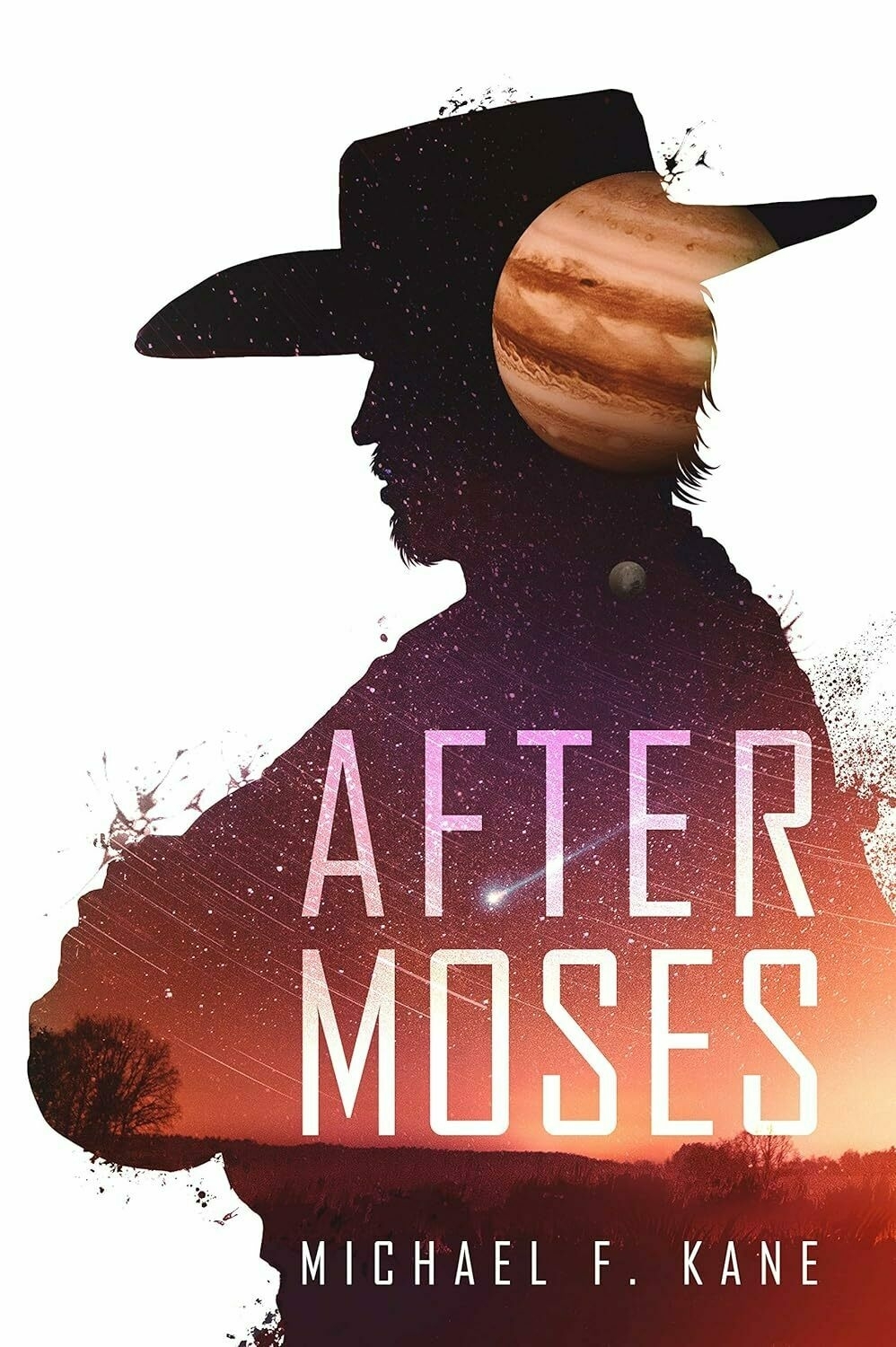 My Twitter pal Trevor has done some great writing on how the Western archetype has been so successful since it’s introduction on the silver screen a century ago. One reason for the success of The Mandalorian is it is essentially a Western set in the Star Wars universe. So too, is Firefly nothing more than a space western, something which no doubt aided its success (with viewers, at any rate, the studio not so much). So when Trevor made note of Michael F. Kane’s, novel After Moses this past September, I purchased the Kindle version because it sounded intriguing, and though my reading queue is already too deep to add more to, I nevertheless did so. With no regrets.
My Twitter pal Trevor has done some great writing on how the Western archetype has been so successful since it’s introduction on the silver screen a century ago. One reason for the success of The Mandalorian is it is essentially a Western set in the Star Wars universe. So too, is Firefly nothing more than a space western, something which no doubt aided its success (with viewers, at any rate, the studio not so much). So when Trevor made note of Michael F. Kane’s, novel After Moses this past September, I purchased the Kindle version because it sounded intriguing, and though my reading queue is already too deep to add more to, I nevertheless did so. With no regrets.
I was so smitten with the first two chapters that I managed to find a slightly used paperback version, and do not regret that, either. For me, there’s something about the printed page, and especially of science fiction novels, since print was all we had back when Michael and I were coming of age. And paperback—though what I read would be referred to today as “mass market” paperbacks while After Moses is more trade sized—were what all the sci-fi greats I first read in the early ’80s were available in.
Matthew Cole is from the Arizona Colony on Mars. He’s what is known as a freelancer; a captain with a ship looking to collect a paycheck by nearly any means necessary. Nearly, because Cole is a gaucho with a conscience. While on one job, he tangles with another freelancer in an armored exo-suit. She gets the better of him, but they are soon reunited as reluctant partners on another job, one where they are betrayed and left for dead.
But it’s pretty hard to kill a seven-foot-tall woman in an armored suit, and she owes Cole, so they track down the criminals and the one who betrayed them to set things right. Which leads to another job for the pair, and as Cole’s broker feeds him more and more jobs, they begin collecting an unlikely crew aboard the ship Cole famously ran solo for a decade. All of whom have secrets they’d rather not share, secrets which may or may not hurt themselves, or the others, should things go bad. And with the last job Benny the broker hands them, things could go very bad indeed.
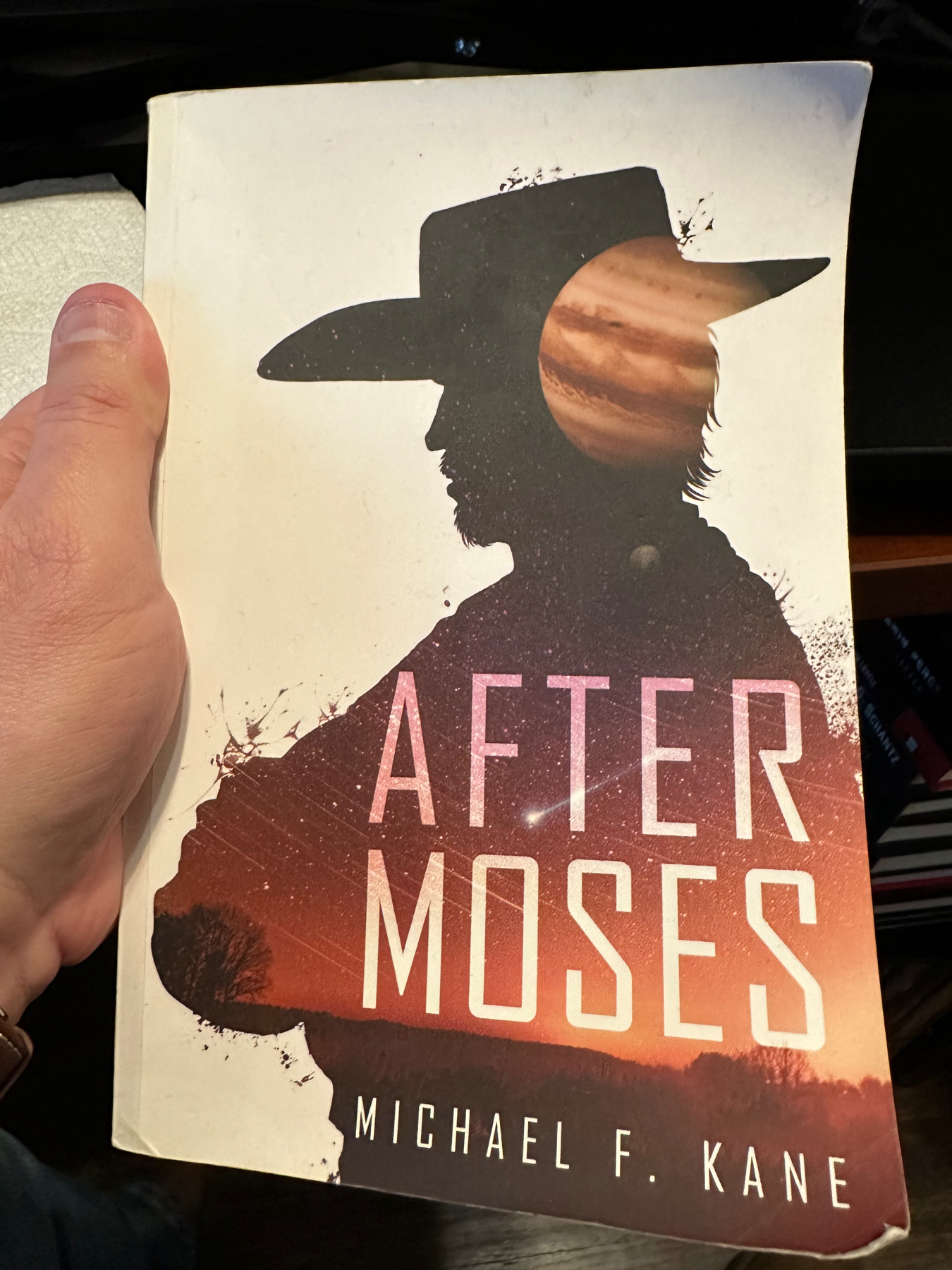 The world-building—or rather, the solar system-building—Kane has done isn’t anything new; readers of the Expanse series will recognize where some of the off-Earth colonies end up, though Kane’s seeding of them comes about in a very different way than that of the writing duo known as Jams S.A. Corey. How those colonies got there is also way more entertaining in Kane’s novel; humanity had help from an AI.
The world-building—or rather, the solar system-building—Kane has done isn’t anything new; readers of the Expanse series will recognize where some of the off-Earth colonies end up, though Kane’s seeding of them comes about in a very different way than that of the writing duo known as Jams S.A. Corey. How those colonies got there is also way more entertaining in Kane’s novel; humanity had help from an AI.
Moses isn’t just any ol' artificial intelligence, however. He is the ultimate artificial intelligence. No one knows where he came from, how he works, or why he’s dedicated himself to helping humanity advance, but there he is benevolently doing it. Until the day he isn’t. Hence the name of the first novel in the series, also named After Moses.
I appreciate Kane’s scientific explanations for space travel. This is by no means a “hard” sci-fi novel, but the frameshift technology actually sounds feasible, given its origin from Moses. The technology doesn’t come across to me as Prometheus (Alien)-slick, but feels more like the lived-in-ness George Lucas envisioned for Star Wars. Which isn’t surprising, given how influential the latter has been on Kane. It also makes sense, given how scientific progress has slowed, since most of it was outsourced to Moses and now he’s gone, as what remains of humanity scrambles to attempt to figure all this wonderful tech he provided out. Things break down, including society, and some if it doesn’t get fixed. Which on the societal side, leads to a serious repercussion.
The character of Matthew Cole and his moral compass really resonated with me. We all have favorite characters from the novels we love, but for me, Cole is one of those I wish was a real person I could sit down and have a conversation with. His hard stance—I would even venture, his hatred—toward slavery, very much a real thing in the After Moses universe due to those aforementioned scientific and societal breakdowns, is not only admirable, but something he takes action upon.
All in all, if you love Firefly, The Mandalorian, Westerns, or just really great writing and heroes trying to do the right thing, you will love After Moses. Highly recommended.
5/5 phins
Retrophisch Review: Unknown Rider
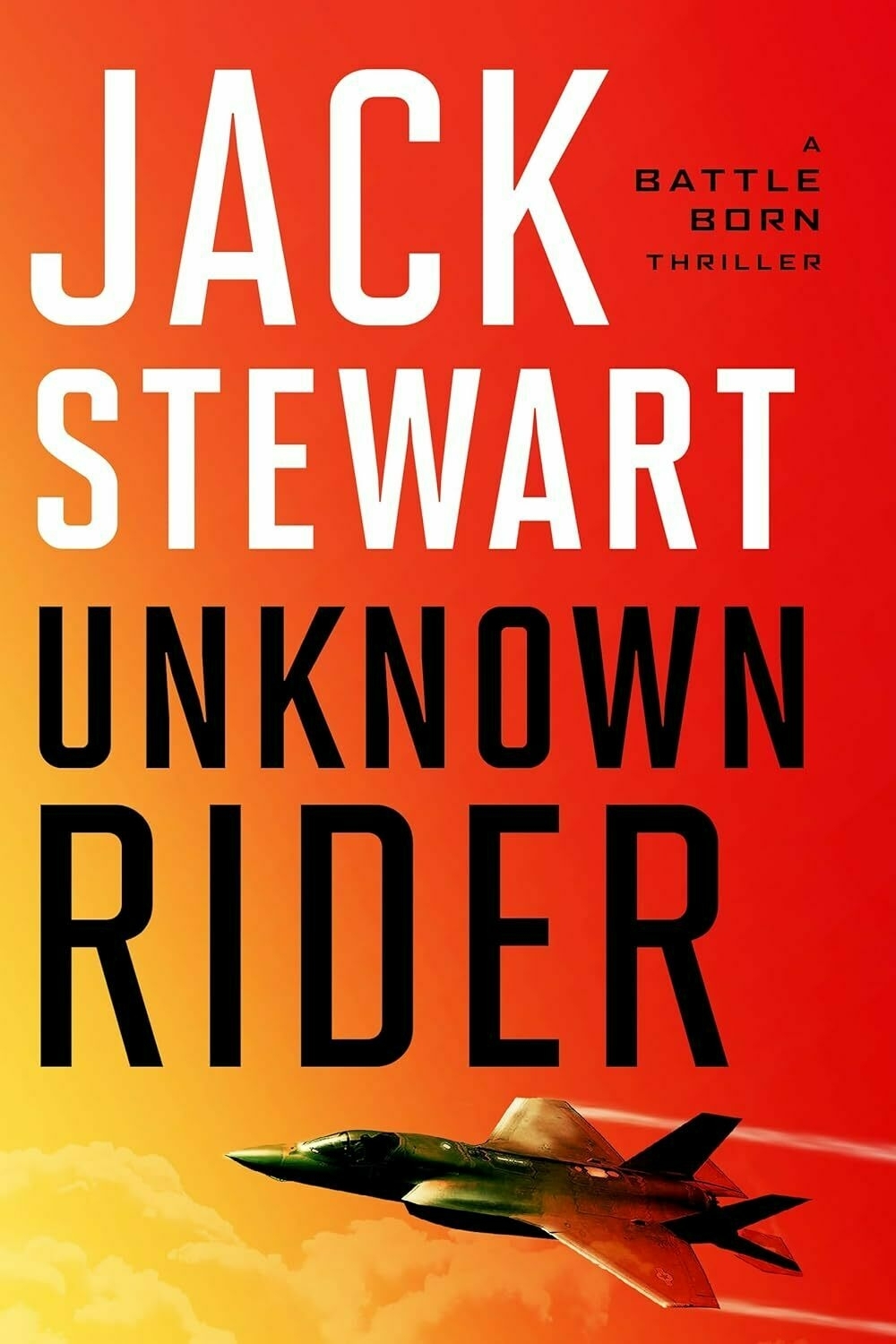 I would be remiss if I didn’t mention the novel I was most excited about this year, and that is Unknown Rider, by my friend Jack Stewart. Jack and I met via Twitter; we both love thrillers and share favorite authors. I met Jack in person, along with Ward Larsen and David McCloskey, at one of Don Bentley’s book signings in Dallas. We would meet up again at two of Jack Carr’s signings. A former Naval aviator, with 23 years as a fighter pilot under his belt, Jack also graduated from the famous TOPGUN Fighter Weapons School. In a word, he knows what he’s talking about.
I would be remiss if I didn’t mention the novel I was most excited about this year, and that is Unknown Rider, by my friend Jack Stewart. Jack and I met via Twitter; we both love thrillers and share favorite authors. I met Jack in person, along with Ward Larsen and David McCloskey, at one of Don Bentley’s book signings in Dallas. We would meet up again at two of Jack Carr’s signings. A former Naval aviator, with 23 years as a fighter pilot under his belt, Jack also graduated from the famous TOPGUN Fighter Weapons School. In a word, he knows what he’s talking about.
While on a routine night flight in his F-35C Joint Strike Fighter, Colt Bancroft is routed to check out mysterious lights which are orbiting above and around one of the escort cruisers in his aircraft carrier’s strike group. As Colt arrives on station, his aircraft fails to respond to his control; nothing he does in the cockpit can keep it from rolling inverted—that’s upside down for us non-pilots—and nosediving down directly at the cruiser. At the last moment, the F-35 veers away from the cruiser and Colt regains control of his aircraft. But not his reputation.
Now deemed a threat to his fellow naval crewmen, and looking at the career he fought so hard for slipping away through no fault of his own, Colt begins his own investigation into what happened that night. He finds himself teaming up with a NCIS agent in the middle of her own hunt for a traitor selling secrets to the enemy, and the two realize not only have their paths intertwined, but the people they are looking for are one and the same. Not knowing who they can fully trust, the pair stumble in to a much bigger, and more dangerous, gambit.
Given my friendship with Jack, it’s impossible for me to be 100% impartial in reviewing Unknown Rider, but as I pored over an Advanced Reader Copy while, appropriately enough, flying, I could tell he was on to something with his debut. Mark Greaney, one of Jack’s writing heroes, nailed it when he said, “Strongly evocative of classic Clancy,” and Mark would know a thing or two about Tom Clancy novels. And that’s just it: if, like us, you grew up loving Tom Clancy, Stephen Coonts, and Dale Brown novels, you will love Unknown Rider. It carries the same spirit and multiple plot lines those authors became famous for. It is definitely recommended, and I can’t wait to see what Colt and Punky get up to next.
5/5 phins, a great debut
Amazon: Hardcover, paperback, Kindle
Barnes & Noble: Hardcover, paperback
Bookshop: Hardcover, paperback
Retrophisch Review: Montezuma Strip
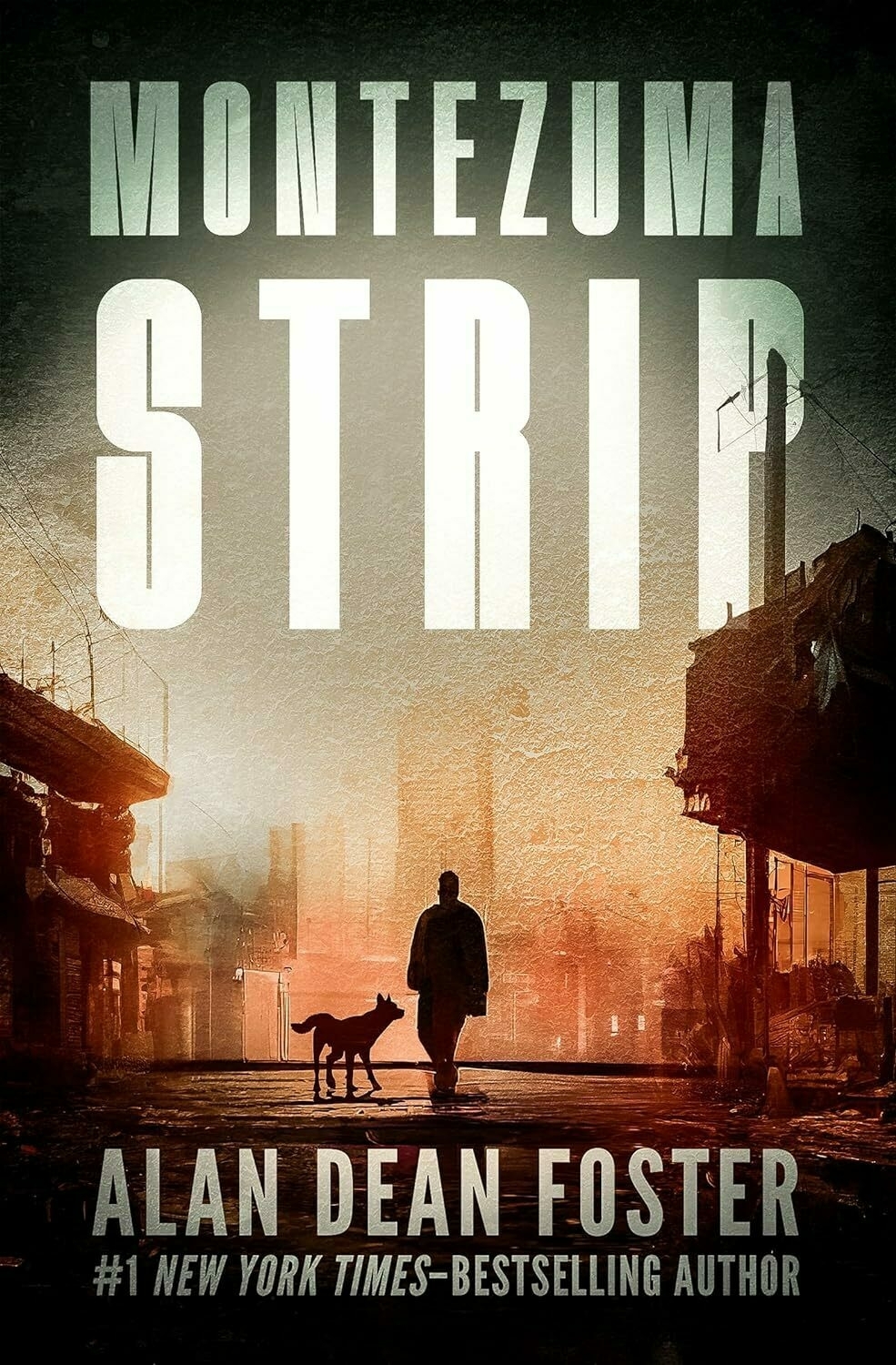 Some times, the Kindle Daily Deal email can really deliver, and one day this month, it did with Alan Dean Foster’s Montezuma Strip. A collection of short stories originally published in 1995, it focuses on an imagined USA-Mexico border a century in the future. Here, “stretching from the Pacific to the Gulf of Mexico,” is the center of techno-industrialization for the world. Like any such place, where there’s industry, there’s greed, and where there’s greed, there’s crime. And crime is the industry Angel Cardenas works in.
Some times, the Kindle Daily Deal email can really deliver, and one day this month, it did with Alan Dean Foster’s Montezuma Strip. A collection of short stories originally published in 1995, it focuses on an imagined USA-Mexico border a century in the future. Here, “stretching from the Pacific to the Gulf of Mexico,” is the center of techno-industrialization for the world. Like any such place, where there’s industry, there’s greed, and where there’s greed, there’s crime. And crime is the industry Angel Cardenas works in.
Cardenas is a Tex-Mex federal cop based out of Nogales. He is also an “Intuit.” Born with a heightened intuition, he is something of a living lie detector. Angel is able to pick up the subtle visual and audible cues we all give off, but rarely glean from others, and this, coupled with his experience and his own logical thinking, makes him a damn good officer. One who is in much demand when crimes in other districts are beyond the ken of local law enforcement.
From figuring out how two software designers were killed, or in Foster’s parlance, “vacuumed,” to infiltrating a protection racket masquerading as a religious order, Cardenas has his hands full in a world where First World technology butts up against Third World labor practices.
I found the world Foster created fascinating, on par with those built by Gibson, Sterling, Stephenson, Rucker, and others in the 1980s and ’90s. If you’ve ever read those authors' dystopian science fiction works, you’ll feel right at home in the Montezuma Strip. Angel Cardenas reads to me like a prototype for Steven Kotler’s Lion Zorn. Given the current socio-political situation on the US-Mexico border, and the deteriorating relationship with China as an economic partner, Foster’s work from nearly two decades ago doesn’t sound as far-fetched as it might have when first published.
If you’re a fan of Alan Dean Foster, cyberpunk-style sci-fi, or just good characters and great writing in general, you won’t be disappointed with Montezuma Strip.
5/5 phins, I loved it.
Amazon: Kindle, Mass Market Paperback
My review of Ryan’s debut novel: www.retrophisch.net/2022/09/0… 📚 twitter.com/RyanSteck…
Retrophisch Review: Fields of Fire
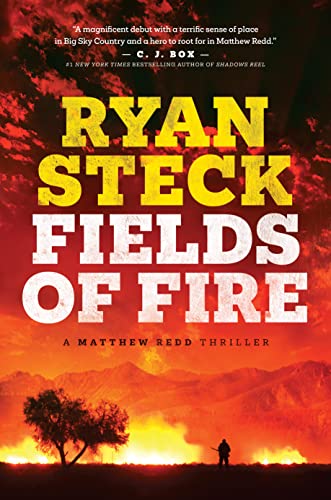 The best conspiracy theories contain an element of truth, and the best novels containing conspiracies do as well. Such is the case with Ryan Steck’s Fields of Fire, the debut novel from the founder of The Real Book Spy, one of the Web’s go-to resources for thriller lovers.
The best conspiracy theories contain an element of truth, and the best novels containing conspiracies do as well. Such is the case with Ryan Steck’s Fields of Fire, the debut novel from the founder of The Real Book Spy, one of the Web’s go-to resources for thriller lovers.
Matthew Redd is doing not only what he loves, but something he is good at as well: being a Marine Raider, part of the tip of the spear that is America’s special operations forces. With nods to the characters of Vince Flynn, Lee Child, Brad Taylor, and others, Redd is a hard-charging Marine with a heart of gold, both thanks to his adoptive father, J.B. But while gearing up for the takedown mission of a scientist-terrorist, Redd is deceived by the person he helps out on the side of the road, and the result is his being disgracefully drummed out of his beloved Corps. To make matters worse, he emerges from the stockade to find out J.B. has died.
Redd sets off to his home in Montana, to the small town and open spaces he hasn’t been around in for close to a decade. He finds himself at odds with his neighbor, the son of a BigTech billionaire, learns his high school sweetheart has returned, and can’t square the messages he’s getting about J.B.’s death with the man himself. Not getting any help from local law enforcement, Redd sets out to get answers using the skills taught to him by J.B. and the Marine Corps.
Ryan Steck enters an already crowded thriller field, but brings something fresh and new in the story of Matty Redd. As not only a lover of the thriller genre, but a student, Steck has learned his lessons well and crafted a solid debut. Incorporating bits of real life, such as the Georgia Guidestones and Bill Gates buying up farmland, albeit in this case his fictitious tech billionaire being the buyer, Steck weaves a conspiracy of global proportions into the rough-and-tumble locale of Big Sky life in Montana.
Steck signed a two-book deal with his publisher, and the next novel is easily but convincingly set up at the conclusion of this one. As an adoptive father myself, I could feel J.B.’s pain and pride as Redd recounted lessons his dad had taught him. I also enjoyed the carefully-laid plot twist. If you are a lover of the thriller genre, this is a great read to add to your library.
4/5 phins, a solid debut
Amazon: Kindle, Hardcover
Barnes & Noble: Hardcover
Indiebound: Hardcover
Today’s @halfpricebooks find: large paperback edition of @wardlarsen’s first David Slaton book. Perfect for the re-read I have planned. (It’s been a long while.)
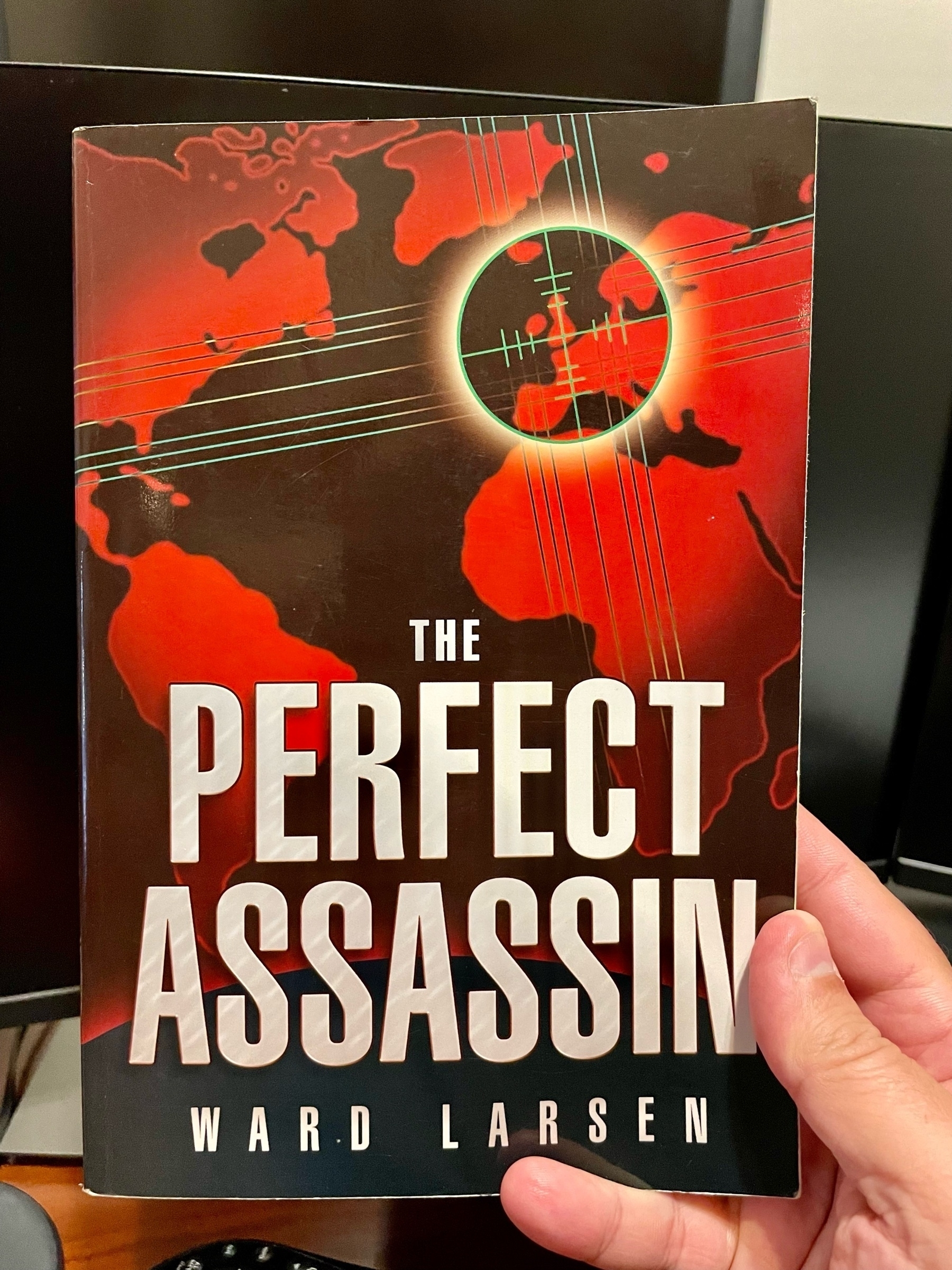
At long last, my review of @TheJasonAnspach and @RealNickCole’s Forgotten Ruin: https://www.retrophisch.net/2022/07/26/retrophisch-review-forgotten.html
tl;dr: Do you like fantasy/D&D/Tolkien? Do you like military thrillers? If so, buy this, you won’t regret it.
Retrophisch Review: Forgotten Ruin
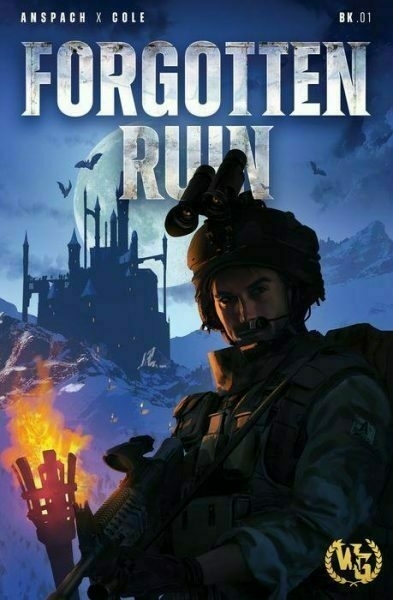 Let’s be clear about one thing right up front: I fully admit I am not an impartial reviewer of this book. Please allow me to explain.
Let’s be clear about one thing right up front: I fully admit I am not an impartial reviewer of this book. Please allow me to explain.
My interests when it comes to reading fiction, like many, took a meandering path through my formative years. Thanks to Star Wars—yes, that was the name of the movie when it came out, none of this retcon naming nonsense—on the big screen when I was six, science fiction was an early staple of my childhood reading. When I was in seventh grade, I came down with chicken pox. Looking forward to a couple of weeks home from school, I sat in the car while my mother went into the school to talk with the front office about getting assignments from my teachers. Then, and God bless her for this amongst so much more, Mom went down the hall to the library, to get me a couple of books. After a discussion with the librarian about what I liked, she came back out with a set of books that changed my life in many ways: Tolkien’s The Hobbit, and The Lord of the Rings.
When I was 15, my dad brought home a paperback from a debut novelist: Tom Clancy’s The Hunt for Red October. Like Star Wars and The Lord of the Rings before it, this was another pivotal moment in expanding my reading horizon. These three still remain to this day: science fiction, fantasy, and thrillers. Oh, and did I mention that thanks to Tolkien and being at a middle school full of other nerds, I started playing Dungeons & Dragons? Well now I have.
So when a novel comes along that combines two of these elements, the military thriller, with fantasy/D&D, and does so very, very well, it is a no-brainer that I am going to love it. And such is the case with Forgotten Ruin.
Take a crack Army unit, throw them a few thousand years into our future, into a Europe disfigured and rearranged by a cataclysmic event which led to the very rearranging of DNA amongst the populace, so that races previously thought of as only fantasy, elves and orcs, are now a reality, and have these Rangers deal with it. Authors Jason Anspach and Nick Cole bill it as “Tolkien meets Shock and Awe.” They have crafted a real gem from a firecracker of an idea, and the execution is flawless from start to finish.
The story is told through Talker, a Ranger-come-lately. Talker is called Talker by the other Rangers because he’s a translator, speaks lots of languages, and not knowing exactly what situation the spec ops units being sent forward in time might encounter, the higher-ups figured it might be good to have some folks attached who can help out in case our heroes end up in a non-English-speaking realm. What the higher-ups don’t account for, as we learn from Talker, is just how far in the future they end up.
Ever wonder what the Battle of Helm’s Deep might have been like if Aragorn, Legolas, Gimli, Théoden, and the Rohirrim had machine guns to use against Saruman’s horde? You’ll get a taste of that and more in Forgotten Ruin. And what about the other units that went through, what happened to them? Talker and his Ranger buddies learn some lessons about them the hard way and seek not to repeat others.
The world Anspach and Cole have created, that of a modern military unit being cast into a medieval-style past/future/alternate reality, is nothing new under the sun, but their choices and execution of same render this nothing short of a masterpiece in the space. Is that too gushing of a sentiment? Tough. I told you at the outset I could not be impartial with this one.
Simply put: if you love military thrillers, if you love sword-and-sorcery fantasy, you will love Forgotten Ruin. Grab yourself a copy, Ranger Up with Talker and the gang, remember to Be Meaner Than It, and enjoy a great read.
5/5 phins
Amazon: Kindle, Paperback Barnes & Noble: Paperback IndieBound: Paperback
Retrophisch Review: The Outside Man
In his debut novel, Don Bentley introduced the world to Matt Drake, a new kind of thriller hero, yet one still recognizable to fans of the genre. Without Sanction was a runaway bestseller, and I was glad to have followed the advice of so many on social media and give it a read. Drake takes the next step on his journey in the follow-up, The Outside Man.
I’ll be honest: I loved this book. In a private message exchange, I told Bentley I thought this was his Empire Strikes Back to the Star Wars of Without Sanction. The first novel sets the stage, but this one 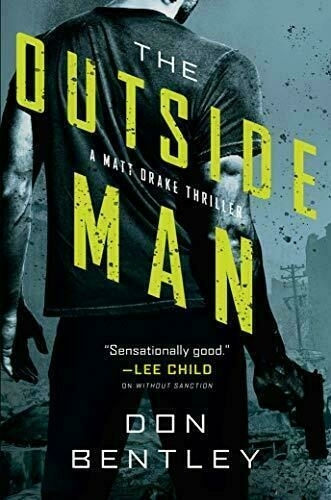 turns the volume all the way to 11 and takes Matt Drake, and his creator, to the next level.
turns the volume all the way to 11 and takes Matt Drake, and his creator, to the next level.
After the events of the first book, this one opens with Matt being ambushed in broad daylight, on the streets of Austin, Texas, no less. There is a terrorist with a score to settle against Drake, backed up by professionals from the Middle East. Our hero manages to survive, but the ambush provides more questions than answers, and Drake is once again plunged into a world he thought he was desperate to leave, but finds his soul needs for him to truly be a part of. The villain we caught whispers of in Without Sanction is fully revealed here, and he is formidable. Worse, he knows exactly where to hurt Matt Drake the most.
One of the things I appreciate about Drake, and Bentley’s writing of him, is that he is fully human. He gets hurt, wounded, injured, and those have real-world consequences that affect how Matt continues his mission. Coupled with his vow to rescue an innocent from a sex-trafficking ring, and his snarky sense of humor, on more than one occasion one is left wondering, “Just how is Matt going to get out of trouble this time?“ As a thriller author, this is exactly what you want in your toolbox, to keep your readers on their toes and guessing what’s next.
Without Sanction was a firm entry into the thriller genre for Don Bentley, but The Outside Man vaults him into the band of my must-read authors, joining Daniel Silva, Mark Greaney, Lee (and now Andrew) Child, Nick Petrie, and Jack Carr. If you’re a fan of the genre, or just someone looking for a great read, The Outside Man is a must-buy.
5/5 fins
Retrophisch Review: The Sentinel
Much has been made of the latest Jack Reacher novel, The Sentinel, due to its collaborative nature between Lee Child and his brother, Andrew Child neé Grant. After 24 Jack Reacher novels, Lee Child felt it was time to step away from the yearly grind of write, publish, promote, and begin enjoying a well-deserved retirement. However, knowing the love fans have for Reacher, Child didn’t want to simply end the series, and enlisted his brother Andrew Grant to take up the mantle. The Sentinel is the first of three planned collaborations before Andrew takes on the series solo.
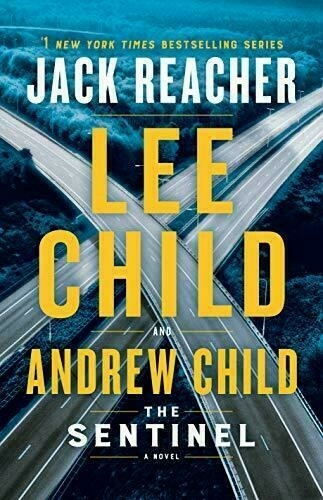 I discovered Jack Reacher—Child’s former Army MP now wandering vigilante—three years after the first book, Killing Floor, was published. I quickly blew through Killing Floor, Die Trying, and Tripwire, and began, like so many other readers, the annual wait for a new Jack Reacher novel to devour. While there are some notable differences with The Sentinel from prior Reacher tomes, devouring this one was no different from the rest.
I discovered Jack Reacher—Child’s former Army MP now wandering vigilante—three years after the first book, Killing Floor, was published. I quickly blew through Killing Floor, Die Trying, and Tripwire, and began, like so many other readers, the annual wait for a new Jack Reacher novel to devour. While there are some notable differences with The Sentinel from prior Reacher tomes, devouring this one was no different from the rest.
Reacher takes himself to Nashville, to listen to good music, which in and of itself is a nod to Reacher’s past, as well as Lee Child’s as Reacher’s creator. The reason Reacher ends up in Margrave, Georgia in Killing Floor is he’s seeking out the home town of a blues man he likes. Reacher, being Reacher, gets involved in sticking up for the little guy in helping a local band, and finds he quickly needs to leave town. He ends up not too far away in Pleasantville, Tennessee. On the streets of the town completely by chance when a daylight abduction is attempted, Reacher thwarts the kidnapping and gets involved in a matter that runs deeper than it first appears, one with implications reaching far beyond the town itself.
There is certainly a different feel with The Sentinel from previous Reacher novels, the result of the collaboration between the brothers. Some reviewers have complained about the tone, or that there is too much expository from Reacher. I didn’t notice much of a change in that regard. As usual, there is ample opportunity for Reacher to say nothing. What stood out to me is that the novel didn’t feel as tight as previous efforts. One of the many things that has made the Reacher novels so popular is that Child’s writing style was as sparse as the main character’s wardrobe. It was a perfect marriage of style and character, and there is something of a departure from that in this latest book.
Nevertheless, I did not find it distracting to the point of losing enjoyment. Reacher is still sticking up the little guy, still mucking up the best-laid plans of those who wish ill on others, still being, well, Reacher. This was a learning process for the brothers, and I expect the next two Reacher novels will get better and better as Andrew establishes himself as the main author in taking on the sole responsibility for an annual Reacher story. While The Sentinel won’t vault into my Reacher top five, it is a solid entry in the Jack Reacher universe.
4/5 fins
[youtube [www.youtube.com/watch](https://www.youtube.com/watch?v=qYTif9F188E?feature=oembed&enablejsapi=1&origin=https://safe.txmblr.com&wmode=opaque&w=250&h=141])
‘The Drinkable Book’, A Pamphlet Teaching Safe Water Drinking Habits Printed on Filter Paper
This is insanely, wicked cool.
This one goes out to all the aspiring writers out there during Children’s Book Week. Don’t forget that you have the power to write your own stories, too! http://powells.us/1qzVd8b
I will always love The Mouse and the Motorcycle.

Featuring rare and never-before-seen artwork, Star Wars Storyboards: The Original Trilogy hits shelves on May 13.
Classic Ralph McQuarrie art used as the original Star Wars novelization cover.
I have this paperback. On a shelf. In my home.
Shocked, I know you are.
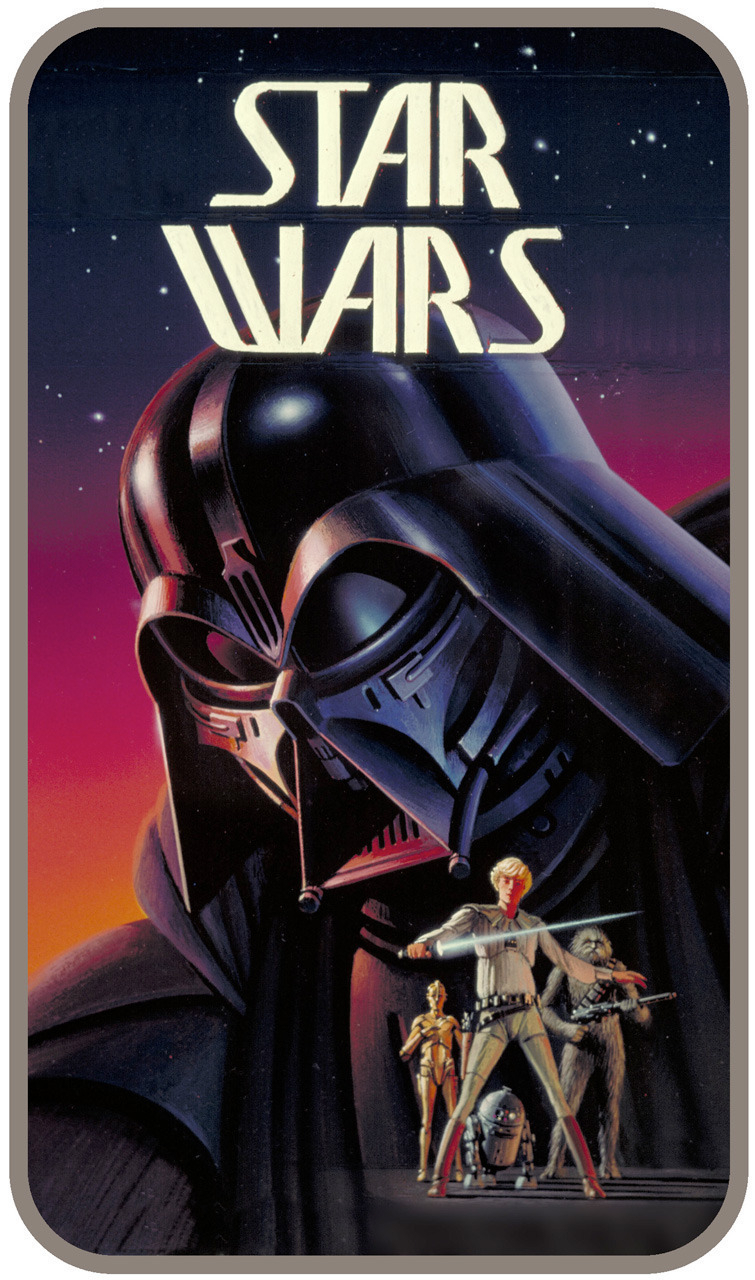
[gallery]
Vader’s Little Princess: In this irresistibly funny follow-up to the breakout bestseller Darth Vader™ and Son, Vader—Sith Lord and leader of the Galactic Empire—now faces the trials, joys, and mood swings of raising his daughter Leia as she grows from a sweet little girl into a rebellious teenager.
Order your copy today for 30% off + Free Shipping at ChronicleBooks.com!
We have all boys, but I’m still buying this book.

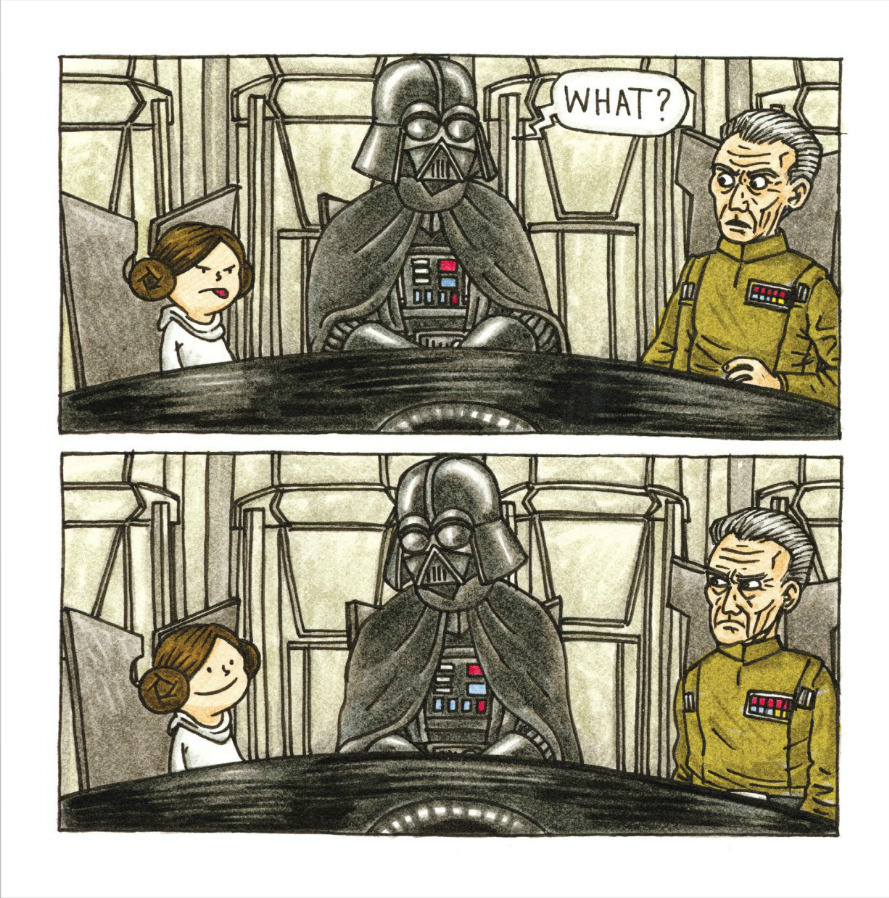

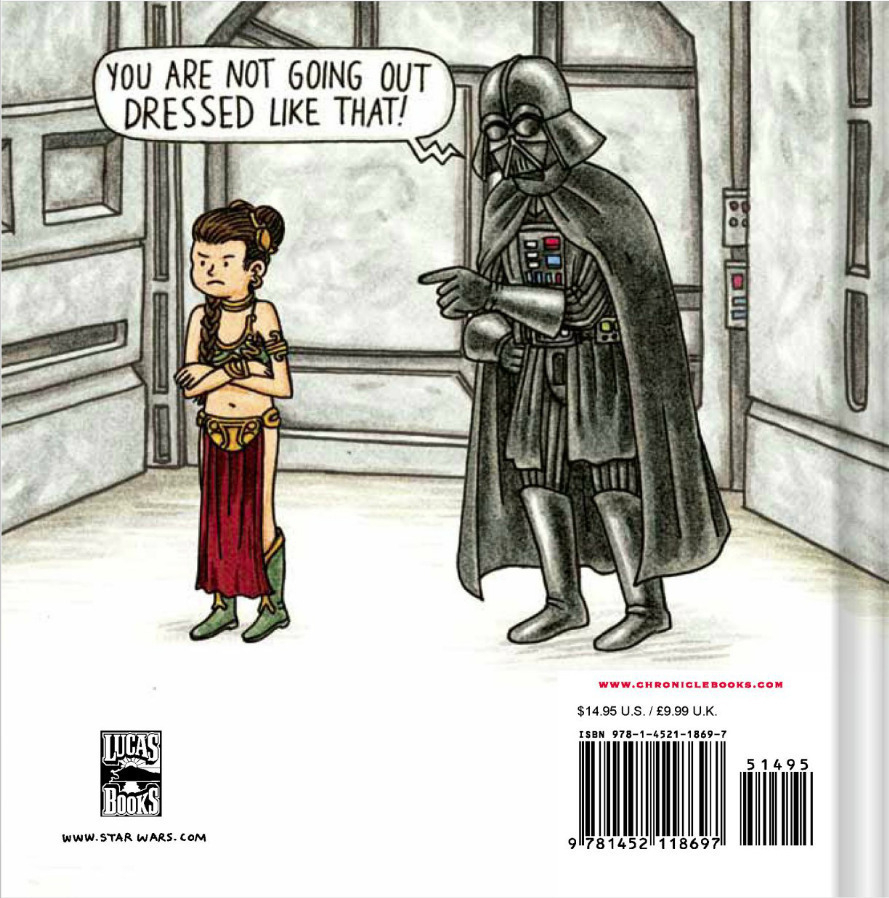
[gallery]
Some books just demand to be read in print. on Flickr.
While I have wholeheartedly bought into e-book reading, there are still many times when I like the feel of a dead-tree edition in my hands. And it seems there are some books that are just written for the printed page, rather than a screen. Craig Johnson’s Walt Longmire series falls into that category for me.
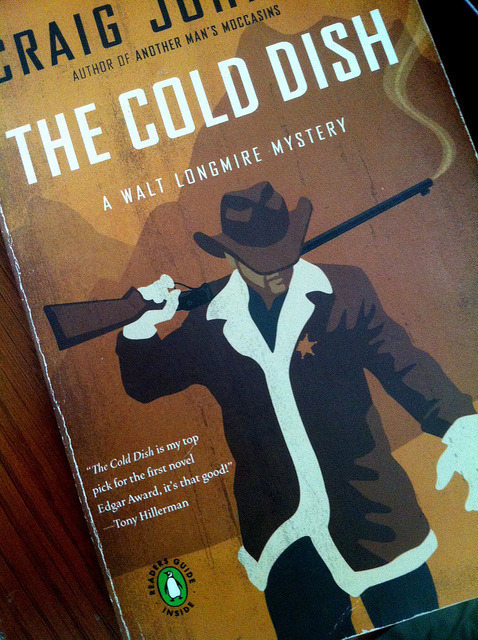
I have the best friends. Thanks again, @crridenour! (Taken with Instagram)


